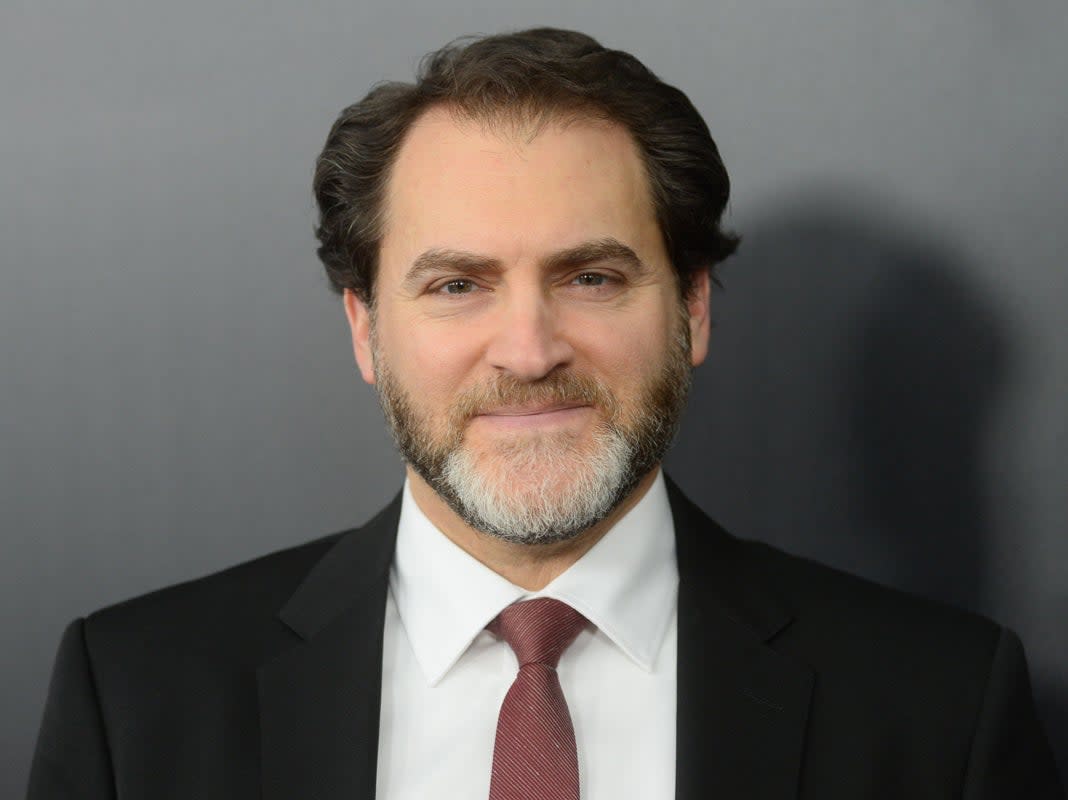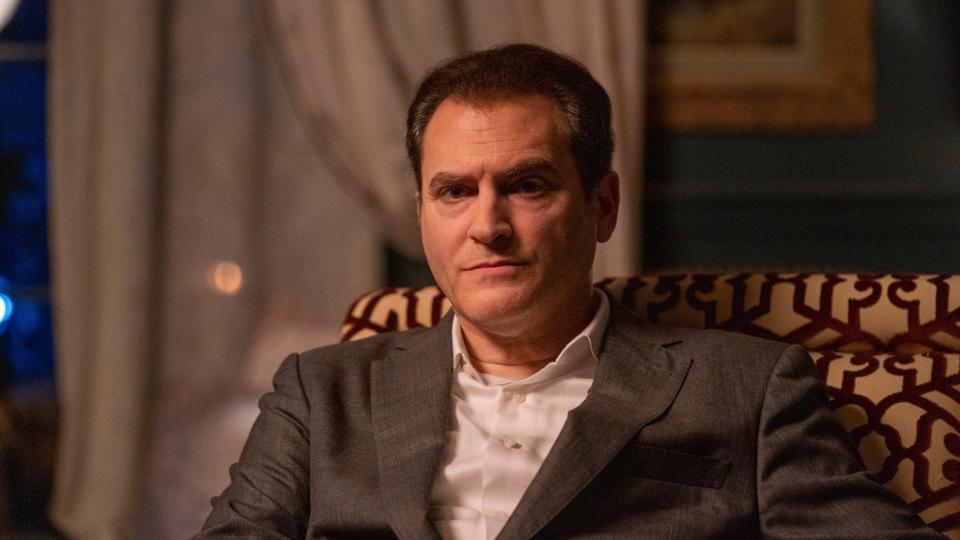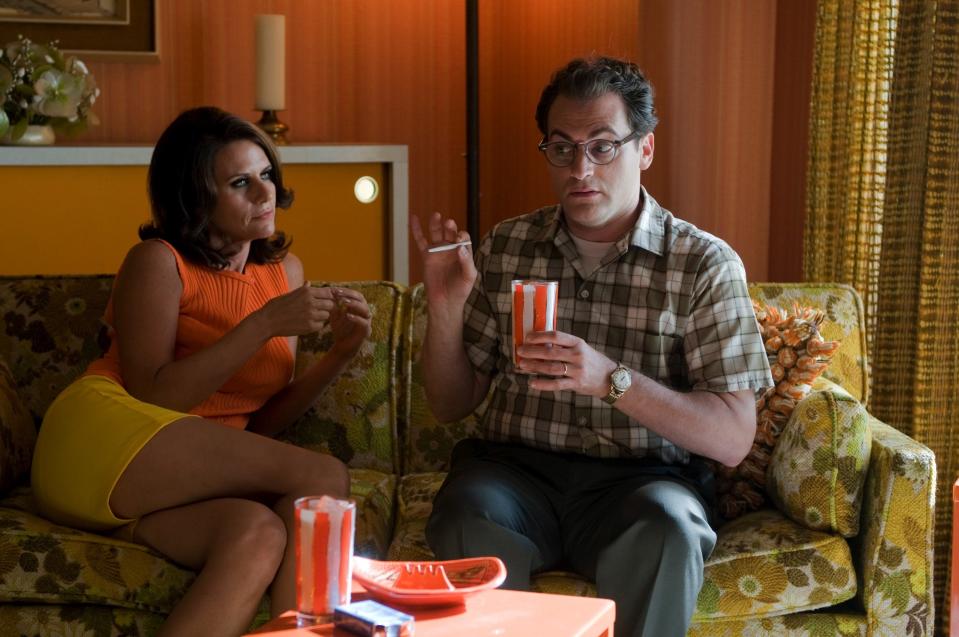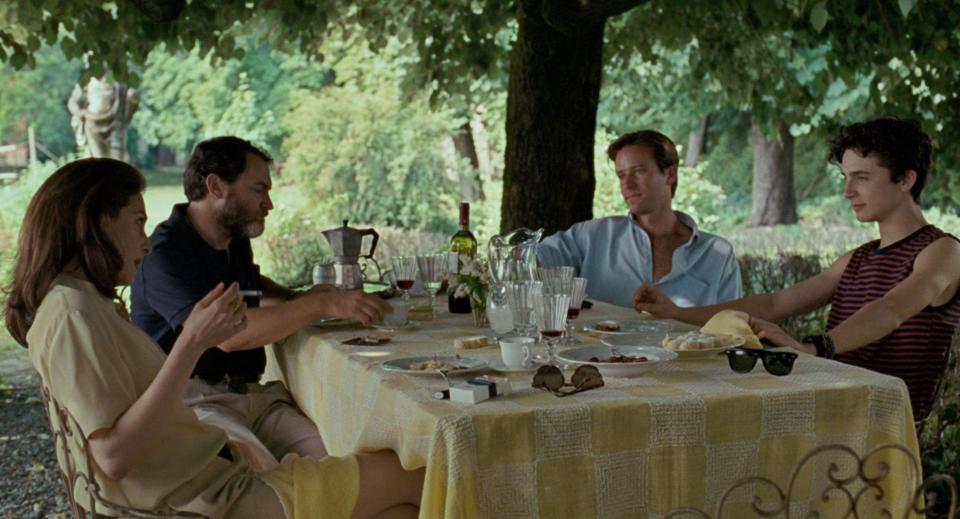Michael Stuhlbarg: ‘I hope the Call Me by Your Name sequel happens’

Stuhlbarg at The Looming Tower premier in 2018
(Erik Pendzich/Shutterstock)Michael Stuhlbarg was in between shows, as Socrates in Tim Blake Nelson’s 2019 play, when he was besieged by a bus load of Call Me by Your Name fans in New York. “They called themselves the Peaches,” recalls the 52-year-old. “There must have been about 60 people. They wanted to express their thanks for the film but also for the performance. It was like having an enormously warm hug from a bunch of strangers out of the middle of nowhere.”
I’m not surprised they wanted to speak to him. Though egregiously overlooked by the Academy, Stuhlbarg’s acclaimed performance in Luca Guadignino’s sensual gay love story found his character anointed “Best Dad Ever” on many an Instagram and Twitter post. As Timothée Chalamet’s father, a watchful archaeology professor who intuits his son’s sexual awakening and doesn’t judge or condescend, Stulhbarg is by turns subtle and unflashy, at the end delivering a graceful, career-high soliloquy, rich in humility and heart-pinching pathos.
“In my place, most parents would hope the whole thing goes away, to pray that their sons land on their feet,” his character says, alluding to his son’s relationship with another man. “But I am not such a parent. In your place, if there is pain, nurse it. And if there is a flame, don’t snuff it out. Don’t be brutal with it. We rip out so much of ourselves to be cured of things faster, that we go bankrupt by the age of 30 and have less to offer each time we start with someone new. But to make yourself feel nothing so as not to feel anything – what a waste!”
The monologue, Stuhlbarg tells me from his home in New York, has “had the greatest impact on me out of everything I’ve done. It’s been a gift that keeps on giving for me.” This sort of gentle self-reflection crops up a lot when talking to Stuhlbarg. Every answer is thoughtful and considered; pauses linger. Even on Zoom you can tell exactly why on-screen he trades in restraint. But there’s also an air that combines compassion with erudition – qualities in his professor in Call Me by Your Name.
At the 2018 Oscars, Call Me by Your Name was one of three films featuring Stuhlbarg to be nominated for Best Picture. In the other two, The Post and The Shape of Water (which won), he again elevated the material with sterling character work. Alas, he wasn’t nominated once. I ask him if that stung. “It’s thrilling to have your name even thrown around under those circumstances,” he explains softly, “because they weren’t made in any kind of succession that you’d imagine that they would come out around the same time. So, no, to answer your question.”
We’re here, on my laptop screen, to discuss Your Honor, a taut new 10-part drama beginning on Sky Atlantic tonight. Adapted from the Israeli series Kvodo by British screenwriter Peter Moffat, it has an ingenious premise: Michael Desiato (Bryan Cranston), a well-respected judge in New Orleans, is faced with a moral dilemma when his teenage son kills another young man in a gruesome hit-and-run accident. Initially instructing his son to lawyer up and come clean, Desiato swiftly changes his mind when he learns that the victim’s father is Jimmy Baxter (Stuhlbarg), a local mafioso bent on revenge. From then on Desiato commits one crime after another, as he draws on all his legal nous to desperately cover up his son’s manslaughter.

In that respect, there are obvious parallels to AMC’s Breaking Bad, in that Your Honor has Cranston again playing an ethically upstanding man pressed to protect his family, sucked deeper and deeper into a quagmire of crime and corruption. Stuhlbarg says the comparisons are “inevitable”. But, he adds, there are layers to Cranston’s performance here that suggest Desiato may have already had a dark side – whereas Breaking Bad’s Walter White, a nebbishy chemistry teacher turned ruthless drug lord, was “more of a pure person”, before a terminal cancer diagnosis prompted him to get inventive in an effort to leave a nest egg for his family. “There are wonderful tiny details in what Bryan does here that suck you in when watching.”
As for Stuhlbarg’s performance – well, he’s just as compelling, playing Baxter as a coiled spring of a man: pained, quietly menacing and capable of paroxysms of rage. Fleshing out the details of his character, he says, was very much a collaborative process, particularly with Moffat, a former barrister who’s written several legal dramas including Criminal Justice and Silk. “The biography that Peter and I constructed together for his background story was so multi-layered that it was not as one dimensional as just being called the mob boss,” he explains. “There were a lot of elements to Jimmy Baxter’s story that were left by the wayside but we spent some very good time together collaborating on who he is, what his family dynamics are, where his money comes from, how he spends his days.”
Stuhlbarg speaks extensively and meticulously about the “craft” of acting. An alumnus of Juilliard, UCLA, Oxford’s British American Drama Academy, and the National Youth Theatre, he spent years training to get where he is now, even studying mime at the University of Michigan, for one summer, with Marcel Marceau. Growing up in Long Beach, California, he first fell in love with acting aged 11, when he joined the community centre’s summer theatre school in the hope of designing, building and painting sets. He ended up being in the chorus to sing “America the Beautiful”.

In his early twenties, he headed east to New York, and quietly, assiduously made a name for himself on stage. His first big break on Broadway was a starring role in Martin McDonagh’s The Pillowman (2005), a macabre black comedy featuring torture, dismemberment and child molestation that McDonagh’s own mother described as “horrific”. Stuhlbarg’s performance, noted New York Magazine, “should finally win over even those who, unlike some of us, have consistently underappreciated his many-sided talent”.
Around that time, Stuhlbarg volunteered for a children’s theatre company in New York, where he met Frances McDormand. When they were cast together in a workshop, he caught the attention of her husband, the director Joel Coen. “Frances knew me well, and I imagine one way or another, they had come to see me in some things,” says Stuhlbarg in typically self-effacing fashion. He was an unknown outside of theatre, and “completely unprepared” for acting on camera, but Coen took a punt. He cast him as the lead in his new film, A Serious Man (2009). Stuhlbarg’s role as a timid Jewish physics professor turned him into a movie star overnight; glowing reviews observed how he seemed to have come out of nowhere.
“It was my first experience in front of the camera,” says Stuhlbarg now. “It opened me up to a whole swathe of people who didn’t know who I was, because there was nothing out there on television or in films for them to see.” After that, there was no looking back. He worked with Martin Scorsese (as a studious film expert in Hugo), Steven Spielberg (as a Kentucky Democrat in Lincoln) and Danny Boyle (as a key player in the early history of Apple in Steve Jobs). He played a multi-millionaire gangster for four seasons of HBO’s Boardwalk Empire, and Hollywood star Edward G Robinson (opposite Cranston) in Jay Roach’s Trumbo (2015). By the time those three Best Picture nominees came around in 2017, he was one of the most respected actors around.
As for what comes next, speculation has been rife about a sequel to Call Me by Your Name, which already exists in book form. André Aciman’s 2018 novel Find Me gives far more focus to Stuhlbarg’s character, Samuel, than the first book. Stuhlbarg can’t say much about it yet, “just that everybody wants it to happen. Luca [Guadagnino] has a whole array of projects in front of him. I imagine they’re going to take their time, but I do hope it happens.”

There’s a danger right now that the controversy surrounding Armie Hammer – he’s been accused by several women of emotional abuse, manipulation and coercion (a lawyer for the actor has described the allegations as “patently untrue”) – could end up derailing the project, though Stuhlbarg believes the scandal “will blow through”. Still, it wouldn’t be his first film to be cancelled because of problems involving a co-star: the Netflix biopic Gore, starring Kevin Spacey as Gore Vidal opposite Stuhlbarg as his partner, was pulled in 2017 after the sexual assault allegations against Spacey blew up. “I had a wonderful experience making that film,” he reminisces. “And I do hope some day it can be seen for what it was meant to be. It’s unfortunate, as for what happened, but also for the work – the hundreds of us who put our time and effort into telling that story. I will wait and see what happens.”
Is there a period of time after which it’s OK to watch the art of people accused of bad things?
“That’s a constant question for all of us, isn’t it?” he muses. “If you didn’t know something about someone, and you saw something they made, you would have one opinion. And then if you learn things about them, they may put you off. That’s one of the enormous questions we have going on in our lives right now. We’ll see,” he says. “We’ll see.”
Your Honor begins on Sky Atlantic and NOW TV tonight


